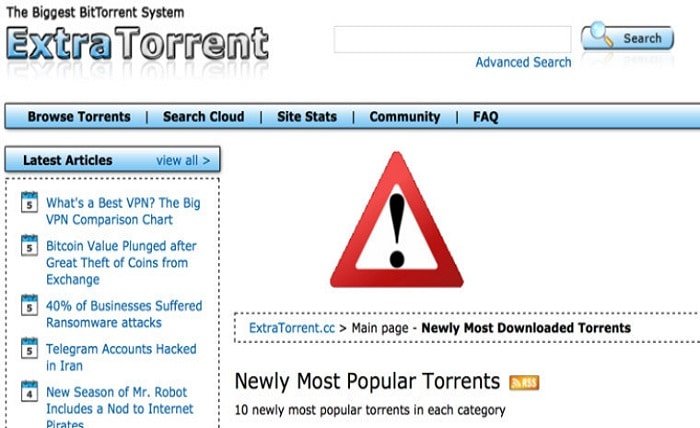Extratorrent: How To Use and About Torrenting World

Introduction
Extratorrents was once one of the most popular and widely used torrent websites in the world, renowned for its extensive collection of torrents that ranged from movies and TV shows to software and games. Since its inception in 2006, Extratorrents attracted millions of users globally until its abrupt shutdown in 2017. This guide provides an in-depth look at Extratorrents, how torrenting works, the legal implications, and the alternatives available today.
In this blog post, we will explore what Extratorrents was, how torrenting works, the reasons for its closure, and its current status. We’ll also delve into popular alternatives, the risks associated with torrenting, and ways to stay safe online.
What is Extratorrents?
Extratorrents was a peer-to-peer (P2P) torrent website that allowed users to share and download torrents of various types of content. It acted as a directory for magnet links and torrent files, which users could download using a torrent client such as BitTorrent or uTorrent. The website quickly gained a large user base due to its vast library of movies, TV shows, music, software, and games.
What made Extratorrents stand out from other torrent websites was its user-friendly interface, regularly updated content, and its active community that provided reviews and feedback on torrents, ensuring users could download high-quality files.
How Does Torrenting Work?
To understand the appeal of Extratorrents, it’s important to grasp how torrenting works. Torrenting uses a technology called peer-to-peer (P2P) file sharing, where files are divided into smaller pieces and distributed across multiple users. Instead of downloading a file from a central server, torrent users download and upload pieces of files simultaneously from other users (peers) who have the file.
This decentralized method allows for faster downloads and reduces the load on any single server. A torrent file itself doesn’t contain the actual content but instead contains information about the file and how to retrieve it from multiple users.
The History of Extratorrents
Extratorrents was launched in 2006 and quickly rose to prominence in the torrenting community. Over the years, it became the go-to platform for people looking to download movies, music, software, and games for free. The site was famous for hosting a vast collection of torrents, which were organized into categories for easy browsing.
In addition to its extensive library, Extratorrents became known for its strong community of users who actively commented on and rated torrents, helping to filter out low-quality or fake files. However, despite its popularity, Extratorrents faced numerous legal challenges throughout its existence.
Why Did Extratorrents Shut Down?
In May 2017, Extratorrents suddenly shut down without warning. The site displayed a message indicating that it had been permanently taken offline, and all mirrors and copies were also deleted. This came as a huge blow to the torrenting community, as Extratorrents had been one of the largest and most reliable torrent sites available.
The shutdown was attributed to mounting legal pressure from copyright holders and law enforcement agencies. Like other major torrent sites, Extratorrents had been targeted for facilitating the illegal distribution of copyrighted material. While the site attempted to stay online by using multiple domain names, it ultimately succumbed to the relentless pressure.
Legal Implications of Using Torrent Websites
One of the key reasons for the shutdown of torrent sites like Extratorrents is the legal risk associated with torrenting. Torrent websites often host files that infringe on copyright laws, such as movies, TV shows, music, and software. Downloading or sharing these files without permission is illegal in many countries and can result in severe penalties.
While torrenting itself is not illegal, downloading or uploading copyrighted content without proper authorization is considered a violation of intellectual property rights. Many governments have cracked down on torrenting websites by blocking access, imposing fines, or even pursuing legal action against users.
Is There a Legal Way to Torrent?
Yes, torrenting can be done legally if the files being shared or downloaded are not copyrighted or if they are distributed with permission from the copyright holder. Several websites offer legal torrents, such as:
- Public Domain Torrents: Offers a collection of classic movies that are in the public domain.
- Internet Archive: A digital library that provides free access to millions of books, movies, software, and more, all available for legal torrenting.
- Legit Torrents: A website dedicated to sharing free and legal torrents of music, games, software, and other media.
While these platforms don’t offer the same variety as Extratorrents, they provide a safe and legal way to engage in torrenting without facing legal repercussions.
Alternatives to Extratorrents
Since the shutdown of Extratorrents, many torrent users have sought out alternatives to fulfill their downloading needs. Some of the most popular torrent websites still active today include:
- The Pirate Bay: Often regarded as the “king” of torrent sites, The Pirate Bay has managed to survive numerous shutdown attempts and continues to provide a wide range of torrents.
- 1337x: Known for its simple interface and well-organized categories, 1337x is a reliable alternative for downloading movies, music, games, and software.
- RARBG: Offers high-quality torrents with detailed information, making it a favorite among users seeking reliable downloads.
- YTS: Specializes in high-quality movie torrents, with a focus on providing small file sizes without compromising video quality.
It’s important to note that these sites, like Extratorrents, carry the same legal risks and should be used with caution.
Risks of Using Torrent Websites
Torrenting comes with several risks, especially when using sites like Extratorrents or its alternatives. The main dangers include:
- Legal Consequences: As previously mentioned, downloading or sharing copyrighted material without permission can result in legal action.
- Malware and Viruses: Many torrent sites are rife with malicious files that can infect your device with malware, viruses, or ransomware. Downloading from untrusted sources can expose your device to these threats.
- Data Breaches: Some torrent websites may collect personal data or expose users’ IP addresses, putting your privacy at risk.
How to Stay Safe While Torrenting
If you decide to use torrent websites, there are a few steps you can take to stay safe:
- Use a VPN: A Virtual Private Network (VPN) hides your IP address and encrypts your internet connection, protecting your identity and data from prying eyes. Many torrent users rely on VPNs to stay anonymous while downloading torrents.
- Install Antivirus Software: Having up-to-date antivirus software can help protect your device from malicious files that may be disguised as torrents.
- Download from Trusted Sources: Stick to well-known and reputable torrent sites that have a strong user community. Read comments and reviews before downloading any file to ensure it’s legitimate and virus-free.
- Avoid Downloading Copyrighted Content: As a rule of thumb, avoid downloading or sharing copyrighted material to reduce your risk of legal trouble.
The Future of Torrenting After Extratorrents
The shutdown of Extratorrents was a significant moment in the history of torrenting, but it hasn’t marked the end of P2P file sharing. Despite the legal battles and shutdowns, torrenting remains a popular method for sharing files. While many sites have come and gone, the community remains resilient, continuously adapting to new challenges.
As more governments and copyright holders take steps to combat illegal file sharing, the future of torrenting may involve a shift towards more secure and private networks, such as decentralized or blockchain-based file-sharing platforms. Legal alternatives to torrenting are also likely to grow, providing users with safe and legitimate ways to access media.
Conclusion
Extratorrents may no longer exist, but its legacy lives on in the torrenting community. While torrenting provides a convenient way to share large files, it’s essential to be aware of the legal implications and risks associated with using torrent websites. By following safety measures like using a VPN and sticking to legal torrent sites, users can protect themselves while still enjoying the benefits of P2P file sharing.
FAQs
- Is Extratorrents still active? No, Extratorrents was shut down in May 2017 and is no longer accessible.
- What are the risks of using torrent websites? The main risks include legal consequences, malware, viruses, and potential privacy breaches.
- Can I torrent legally? Yes, torrenting itself is not illegal, but downloading copyrighted material without permission is. You can use legal torrent sites like Internet Archive and Public Domain Torrents.
- What are some good alternatives to Extratorrents? Popular alternatives include The Pirate Bay, 1337x, RARBG, and YTS.
- How can I stay safe while torrenting? To stay safe, use a VPN to protect your identity, install antivirus software, and download files only from trusted sources.



